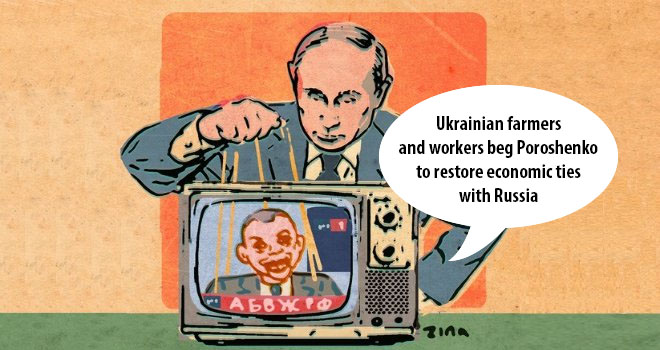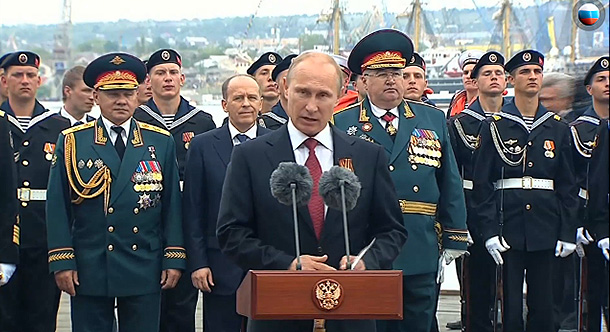Russia’s annexation of Crimea and the war in Donbas became a burden for the Russian treasury. Moreover, the war in Syria is also expensive for the country. The situation for the Russian budget is aggravated due to the sanctions imposed on it by the EU, US, and Ukraine. However, Vladimir Putin can't gave up his military activities, and getting rid of sanctions is the only way for him to attract additional finances for war. It appears that the Kremlin is conducting a campaign to shift public opinion towards the acceptability of lifting economic sanctions against an aggressor and violator of international law. In Ukraine, the Russian Federation has used a disinformation campaign aiming to show that Ukraine can’t survive without restoring economic relationships with Russia. And while one can think that the messages that are being spread are calling for the peaceful resolution of the situation, in fact they are just an additional instrument for raising money for more wars. In the case of Ukraine, this is also an instrument to weaken resistance against Russian occupation and get it back under Russian influence by turning the country away from the path of EU integration.
Investigation by media watchdog reveals disinformation campaign in Ukrainian media

Currently, the topic of renewing economic relationships between Ukraine and Russia appears quite frequently in the Ukrainian information space, and the methods of messaging become more and more creative. Detektor Media, a Ukrainian media watchdog, recently revealed who stands behind these messages and how they are spread across Ukraine in an investigation. Watch out, similar technology can be used in any other country.Obviously, someone really needs to create the impression that ordinary Ukrainians, MPs, industrialists, and farmers just can’t live without economic relations with Russia.
Since late summer 2016, the message that “to save Ukraine's economy, economic relationships with Russia have to be renewed no matter what” was actively spread in some Ukrainian and Russian media. The culmination of the campaign was an interview of the fugitive Ukrainian oligarch Dmytro Firtash, who will be detained on allegations of corruption should he return to Ukraine, to the Russian media outlet Ukraina.ru. Apart from his other businesses, Firtash also is a co-owner of the Inter media group.
In the interview Firtash complains that “one third of Ukrainian enterprises are unprofitable.” According to him, this is because of the termination of the Ukrainian-Russian collaboration, stressing:
“We are fighting for a market from Lisbon to Vladivistok. We need European, Russian and Chinese investments. We need markets and partners. The Russian market is especially important for Ukraine. We need to use it,” says Firtash.
Before the interview was published, a number of materials appeared in Ukrainian media to prepare the ground. Some messages were voiced by pro-Russian MPs. The rest were based on fake news.
The technology in action

Detektor Media names the MPs who called to restore economic relationships with Russia. They were:
- Mykola Skoryk, Opposition Bloc (the successor of the tyrant Yanukovych Party of Regions)
- Yevheniy Muraiev, unafilliated MP, before represented Opposition Bloc faction in Parliament
- Iakiv Bezbakh, unafilliated MP, used to be a member of the Party of Regions.
- Anton Kisse, deputy group Vidrodzhennia (the majority of the group used to belong to the Party of Regions)
- Oleh Nedava, an MP from the Petro Poroshenco Bloc, is associated with the influential businessmen and an MP of the Yanukovych times Yuriy Ivanuschenko
- Viktor Branskyi, an Opposition Bloc deputy of the Odesa Oblast Council
Only Muraiev and Baranskyi expressed their opinions on the topic openly. Others, as Detektor Media revealed, were asked questions and recorded by people without microphones which are suppose to identify a media. The videos were uploaded to YouTube channels which had only 1-2 videos before that. From those channels, the video was spread to Ukrainian and Russian media outlets. What is more, the media who published the videos with the MP’s messages quoted each others.
These are the Ukrainian media outlets which were involved in quoting calls to restore the relationships with Russia:
- 112 Channel
- Timer
- UNN
- Korrespondent
- AiF in Ukraine
When the amount of the messages accumulated, labor unions of different factories and enterprises in Ukraine started writing appeals to President Petro Poroshenko asking to restore the relationships with its eastern neighbor.
Here are some examples of the headlines:
Zaporizhzhia farmers demand from Poroshenko to make peace with Russia
Dnipropetrovsk Oblast manufacturers demanded Poroshenko restore trade with the Russian Federation and abandon European integration
Cherkasy plant Finval 2006 demanded Poroshenko revive ties with Russia
The news were followed by petitions allegedly from labor unions of the factories and enterprises. Some petitions were also published on the sites of the enterprises and factories. However, it’s safe to call them a set-up. Here is what the journalists revealed about these news and petitions:
2. The employees of the enterprises did not sign the petitions. The journalists reached out to Kaprpatnaftokhim, Stepnoi factory, Lihachevskyi bread factory, and were told that the enterprises have already refuted reports that they signed the documents. The journalists of Obozrevatel also received a refutation of the fake published about the factory Finval 2006. However, for some reason, the refutations were spread mostly in the local media which have no major influence.
3. In two cases, documents for the fake news reports were created with the forged signatures of the heads of the enterprises.
4. In the case of the Zaporizhzhia plant of household appliances, news about the alleged demand to restore relationships with Russia were based on a random blog on the medium platform by a user called Zaporozhie.
5. In Russia, the news linked to larger Ukrainian sites, which in their turn linked to smaller regional sites. Many of the Russian publications were followed by information that “against the background of these appeals in October 11, the group on restoring economic relationships with Russia was created in the Verkhovna Rada [Ukrainian Parliament].” The group was indeed created a day before Firtash's interview was published. It was initiated by the abovementioned Bezbakh.

In December, the so-called petitions were also enhanced by the similar petitions allegedly with demands of ordinary citizens. The petitions were published on the sites of the councils of the Dnipropetrovsk, Chernihiv, and Poltava oblasts and on the site of the city council of Kropyvnytskyi. The petitions reached the threshold needed to make the topic be discussed at meetings of the councils. However, the journalists of StopFake revealed that the Dnipropetrovsk, Chernihiv and Poltava oblasts petitions have signs of forgery:
"To create an account for signatures for a petition anonymous foreign VPN-servers and the servers from the territory which is not controlled by Ukraine, in particular, the city of Luhansk, were used. Also, according to the register, several people signed the petition from the same IP-address. There were cases when one server was used more than by 300 users," Poltava Oblast council head Anna Shavir told StopFake. The three petitions are identical and are written in Ukrainian with mistakes.
Then, petition-signing was organized a a higher level: Bezbakh started calling on Ukrainian MPs to sign them.
How much does this cost?

Using the new technology is expensive. According to Detektor Media which spoke to Ukraine’s Security Service, before autumn of 2016, fake news were being spread only through media resources which are under control of (pro-)Russian forces and via social media. Now the new technology seems to be systematic. It needs a larger budget to pay for publishing fake news in Ukrainian outlets, creating fake sites, and spreading the information across Russia."The cheese is getting spoiled, the enterprise’s employees are sitting with no salary. Mr.Poroshenko, restore economic relations with Russia"
Another Ukrainian media liga.net wrote that some people applied to them with a suggestion to publish information with calls to restore the relationships with Russia.
The journalist of liga.net was given a proposal (by some intermediary) to use his connections in media to lobby the publication of an appeal of some employees to restore economic relationships with Russia to the President of Ukraine. It was clarified in the order that they are interested in enterprises employing over 300 people. The journalist’s work involved identifying the target enterprise that potentially would agree to the publication (they, ostensibly, would also be paid by the “client” for agreeing to participate in the campaign), creating the text which would be published on the official site of the company.
"For example, they can write that earlier they successfully exported cheese and 70% went to Russia. Europe doesn’t need our cheese. This results in a certain percentage of unsold goods, and a certain amount of loss. The cheese is getting spoiled, the enterprise’s employees are sitting with no salary. Mr.Poroshenko, restore economic relations with Russia,” is an example text that the “client” gave the journalist.
Liga.net’s sources gave an off-the-record confirmation that indeed such campaign had been started and that it was initiated from Russia.
According to the journalist, he was offered from $500 to $1,000 (depending on the importance of the enterprise, the amount of time the petition would be present on the site, its text and demands to the president) to participate in the campaign.
Also, he was told that after agreeing and sending a link to the published news item he will receive the money to his bank account, and he was invited to submit 5-10 pieces until the end of 2016. The author explains that the incident happened in the middle of December so that the client would have potentially paid him from $2,500 to $10,000.
Taking into consideration the new technology and the latest claims of Ukrainian oligarchs, we can assume that the topic will appear more often on the agenda this year. Probably, this is an instrument of Russia's campaign to lift sanctions, and the target is politicians who have the power to do this.
“Obviously, someone really needs to create the impression that ordinary Ukrainians, MPs, industrialists, and farmers just can’t live without economic relations with Russia. And it would be good to figure out who is behind this well-paid delivery of fakes to Ukrainian media. In fact, there aren’t that many options,” Detektor Media sums up its investigation.
Message spreads to international media
We can estimate that with the changes in the political leadership of Western countries, calls to lift sanctions against Russia will sound more and more often. In early 2017, OSCE Chairperson-in-Office and Austrian Minister of Foreign Affairs Sebastian Kurz visited Ukraine. Together with representatives of the Ukrainian Ministry of Foreign Affairs, he visited the front line in Donbas.
A few days later, he gave an interview with the Austrian media Osterreich24 in which he said he wants to change sanctions against Russia from a logic of punishment to a logic of incentives.
“For each positive development on the ground, a partial withdrawal of the sanctions is to take place. That would be a clear signal to Russia,” said the minister.

The interview to Austrian media outlet Osterreich24 is real, unlike his alleged calls for Russian-Western unity broadcast by RT-Ruptly TV, which were debunked by StopFake.
Similar views were voiced by Ukrainian oligarch Viktor Pinchuk in the end of 2016, whose piece in The Wall Street Journal called “Ukraine Must Make Painful Compromises for Peace With Russia” caused outrage in Ukraine.
Read also: Western media happy to whitewash Ukraine’s corrupt old guard





